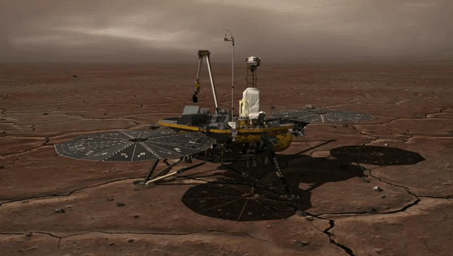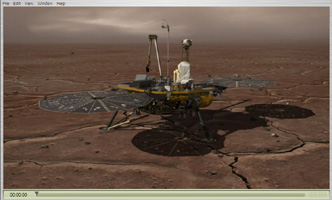
|
How Phoenix Talks to Earth
- Click the image above for a larger view
 Movie Download Options
Movie Download Options- Full-Res JPEG (800 x 452) (37.5 kB)
- Full-Res TIFF (800 x 452) (1.1 MB)
Caption:

Click on the image for the animation
This animation shows how NASA's Phoenix Mars Lander stays in contact with Earth. As NASA's Mars Odyssey orbiter passes overhead approximately every two hours, Phoenix transmits images and scientific data from the surface to the orbiter, which then relays the data to NASA's Deep Space Network of antennas on Earth. Similarly, NASA's Deep Space Network transmits instructions from Earth to Odyssey, which then relays the information to Phoenix.
Background Info:
The Phoenix Mission is led by the University of Arizona, Tucson, on behalf of NASA. Project management of the mission is by NASA's Jet Propulsion Laboratory, Pasadena, Calif. Spacecraft development is by Lockheed Martin Space Systems, Denver.
Photojournal Note: As planned, the Phoenix lander, which landed May 25, 2008 23:53 UTC, ended communications in November 2008, about six months after landing, when its solar panels ceased operating in the dark Martian winter.
Cataloging Keywords:
| Name | Value | Additional Values |
|---|---|---|
| Target | Mars | |
| System | ||
| Target Type | Planet | |
| Mission | Phoenix | 2001 Mars Odyssey, Deep Space Network (DSN) |
| Instrument Host | Phoenix Lander | Mars Odyssey |
| Host Type | Lander | Orbiter |
| Instrument | ||
| Detector | ||
| Extra Keywords | Color, Movie, Radio | |
| Acquisition Date | ||
| Release Date | 2008-05-26 | |
| Date in Caption | ||
| Image Credit | NASA/JPL-Caltech/University of Arizona | |
| Source | photojournal.jpl.nasa.gov/catalog/PIA10695 | |
| Identifier | PIA10695 | |
